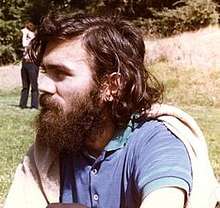Stevo Todorčević
Stevo Todorčević FRSC is a Yugoslavian mathematician specializing in mathematical logic and set theory. He holds a Canada Research Chair in mathematics at the University of Toronto,[1][2] and a director of research position at the Centre national de la recherche scientifique in Paris.
Stevo Todorčević | |
|---|---|
 Todorčević in 1984 | |
| Born | February 9, 1955 (age 65) |
| Alma mater | University of Belgrade |
| Awards | Balkan Mathematical Society First Prize 1980, 1982 CRM-Fields-PIMS 2012 Shoenfield 2013 Gödel Lecturers 2016 |
| Scientific career | |
| Fields | |
| Institutions | University of Toronto CNRS |
| Thesis | Results and Independence Proofs in Combinatorial Set Theory (1979) |
| Doctoral advisor | Đuro Kurepa |
Early life and education
Todorčević was born in Ubovića Brdo. As a child he moved to Banatsko Novo Selo,[3] and went to school in Pančevo.[4] At Belgrade University, he studied pure mathematics, attending lectures by Đuro Kurepa. He began graduate studies in 1978, and wrote his doctoral thesis in 1979 with Kurepa as his advisor.[5]
Research
Todorčević's work involves mathematical logic, set theory, and their applications to pure mathematics.
In Todorčević's 1978 master’s thesis, he constructed a model of MA + ¬wKH in a way to allow him to make the continuum any regular cardinal, and so derived a variety of topological consequences. Here MA is an abbreviation for Martin's axiom and wKH stands for the weak Kurepa Hypothesis.[6] In 1980, Todorčević and Abraham proved the existence of rigid Aronszajn trees and the consistency of MA + the negation of the continuum hypothesis + there exists a first countable S-space.[7]
Awards and honours
Todorčević is the winner of
- the first prize of the Balkan Mathematical Society for 1980 and 1982,[8]
- the 2012 CRM-Fields-PIMS prize in mathematical sciences,[9] and
- the Shoenfield prize of the Association for Symbolic Logic for "outstanding expository writing in the field of logic" in 2013, for his book Introduction to Ramsey Spaces.[10][IRS]
He was selected by the Association for Symbolic Logic as their 2016 Gödel lecturer.[11]
He became a corresponding member of the Serbian Academy of Sciences and Arts as of 1991 and a full member of the Academy in 2009.[12] In 2016 Todorčević became a fellow of the Royal Society of Canada.[13]
Books
Todorčević is the author of books in mathematics that include:
- Partition problems in topology (1989)[14]
- Some applications of the method of forcing (with I. Farah, 1995)[15]
- Topics in topology (1997)[16]
- Ramsey methods in analysis (with S. A. Argyros, 2005)[17]
- Walks on ordinals and their characteristics (2007)[18]
- Introduction to Ramsey spaces (2010)[19]
- Notes on forcing axioms (2014)[20]
References
- Canada Research Chairholders: Stevo Todorcevic, retrieved 2012-03-07.
- Department of Mathematics, Stevo Todorcevic, Canada Research Chair Professor
- Rešavač „nerešivih“ problema
- „Uroš Predić“ Grammar School, Pančevo
- Stevo Todorčević, memories of Ž. Miloradović
- Larson 2012, p. 281
- Larson 2012, p. 290
- Le 6ème Congrès Européen de Mathématiques Cracovie, 2 au 7 Juillet 2012
- Stevo Todorcevic (Toronto) receives 2012 CRM-Fields-PIMS Prize, Fields Institute, retrieved 2012-03-07.
- Stevo Todorcevic receives 2013 Shoenfield Prize for a book, ASL, retrieved 2014-07-07
- The Twenty-seventh Annual Gödel Lecture 2016: Stevo Todorcevic
- Membership, Serbian Academy, retrieved 2012-03-07.
- Eight U of T science faculty join Royal Society of Canada as fellows
- MR0980949
- MR1486583
- MR1442262
- MR2145246
- MR2355670
- MR2603812
- MR3184691
Sources
- Larson, Jean A. (2012), "Infinite combinatorics", in Gabbay, Dov M.; Kanamori, Akihiro; Woods, John (eds.), Sets and extensions in the twentieth century, Handbook of the History of Logic, 6, Amsterdam: Elsevier/North-Holland, pp. 145–357, doi:10.1016/B978-0-444-51621-3.50003-7, ISBN 978-0-444-51621-3, MR 3409860.
- RSC Fellowship Citation and Detailed Appraisal: Stevo Todorcevic
External links
- CRM Fields PIMS Prize Lecture: Prof. Stevo Todorcevic (photo album)
- CRM-Fields-PIMS Prize Lecture: Stevo Todorcevic (University of Toronto)
- Stevo Todorcevic at University of Toronto
- Stevo Todorcevic at Institut de mathématiques de Jussieu – Paris Rive Gauche
- Todorčević najcenjeniji (Todorčević most respected)(in Serbian)
- Dispute over Infinity Divides Mathematicians by Natalie Wolchover, Quanta Magazine, November 26, 2013; contains some comments on choices of axioms for set theory
- Stevo Todorcevic at Institute for Advanced Study
- Prof. Todorčević Interview(in Serbian)